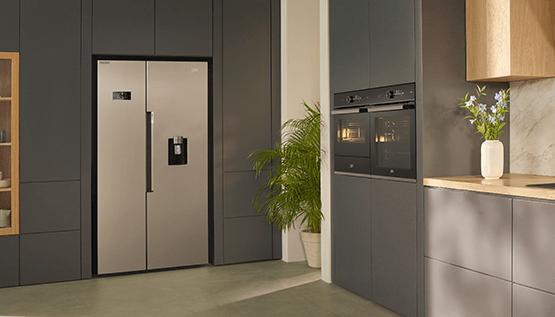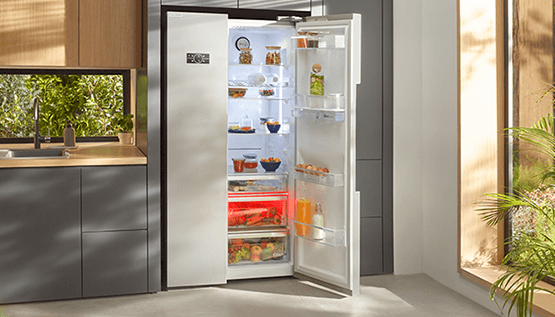Can You Put a Fridge Freezer Next to a Radiator?
When planning a kitchen layout, one key consideration is the placement of appliances. A common question homeowners often have is whether it’s advisable to place a fridge freezer next to a radiator. The short answer is no; it’s not recommended.
Fridge freezers are designed to keep food cool, while radiators are meant to emit heat. Placing these two opposing elements next to each other can lead to several issues, including increased energy consumption, potential damage to the appliance, and compromised safety. In this article, we will explore the risks, efficiency concerns, safety hazards, and thermal implications associated with placing a fridge freezer next to a radiator.

Risks of placing a fridge freezer next to a radiator
Positioning a fridge freezer next to a radiator can lead to a myriad of problems. The primary concern is the inefficiency it causes. When exposed to external heat, the fridge freezer has to work harder to maintain its internal temperature, leading to higher energy consumption and increased utility bills. The constant battle against the heat can also shorten the lifespan of the appliance.
Efficiency
The efficiency of a fridge freezer is significantly reduced when placed near a radiator because it needs a stable, cool environment to work properly. When exposed to a heat source, the compressor must run more frequently and for longer periods to keep the interior cool. This increased workload not only consumes more energy but also accelerates wear and tear on the appliance's components.
If your fridge is positioned too close to a heat source, you may face higher energy bills and a need for more frequent repairs or even early replacement of the unit. Proper placement is crucial for maintaining energy efficiency and prolonging the appliance's lifespan.
Safety hazards
Apart from efficiency concerns, placing a fridge freezer next to a radiator can lead to safety hazards. The additional heat can cause the fridge’s motor and compressor to work harder, potentially leading to overheating.
Although compressors are equipped with an internal safety temperature cut-off that shuts down the compressor if it gets too hot, the risk of damage remains. Heat from an external source, like a radiator, can cause harm to the appliance’s cabinet or door seals. This is similar to the risks associated with installing a fridge freezer next to an oven or cooker.
Additionally, the exterior casing of the fridge can become hot to the touch, which can be particularly dangerous in households with children or pets. To prevent these hazards, it’s essential to maintain a safe distance between the fridge and any heat sources.
How heat affects fridge freezers
Heat has a profound impact on the performance and durability of fridge freezers. The appliance is designed to extract heat from the inside and dissipate it externally. When external temperatures are high due to proximity to a radiator, this process becomes less efficient.
Cooling mechanisms
Fridge freezers employ cooling mechanisms that rely on transferring heat from the inside to the outside environment. When the surrounding air is warm, these mechanisms struggle to dissipate heat effectively, leading to a less efficient cooling process. If you notice your fridge isn't cooling properly, there are plenty of steps you can take to ensure it cools properly and maintains the correct temperature.
Fridge size
The size of the fridge freezer also plays a role in determining the ideal distance. Larger units generate more heat and require more space for proper ventilation. In some cases, it might be advisable to increase the distance beyond 30 cm to ensure sufficient airflow and prevent overheating.
Exterior Damage
Prolonged exposure to heat can also cause damage to the exterior of the fridge freezer. The materials used in the construction of these appliances can warp or degrade over time when subjected to high temperatures, resulting in an unsightly appearance, and potentially compromising the structural integrity of the appliance.
What is the recommended distance between a fridge and a radiator?
To avoid these issues, it is crucial to maintain an appropriate distance between a fridge freezer and a radiator.
Best performance

For optimal performance, it is generally recommended to keep a minimum distance of at least 30 cm (12 inches) between the fridge freezer and any heat source. This distance allows for adequate airflow around the appliance, helping it to dissipate heat more effectively and operate efficiently.
Fridge size

The size of the fridge freezer also plays a role in determining the ideal distance. Larger units generate more heat and require more space for proper ventilation. In some cases, it might be advisable to increase the distance beyond 30 cm to ensure sufficient airflow and prevent overheating.
Tips for safe layout
When configuring or updating your kitchen layout, consider the following tips to ensure the safe and efficient placement of your fridge freezer:
- Avoid Heat Sources: Place your fridge freezer away from radiators, ovens, and direct sunlight. These heat sources can negatively impact the appliance's performance and safety.
- Ensure Adequate Ventilation: Leave sufficient space around the fridge for proper air circulation. Check the manufacturer’s guidelines for specific ventilation requirements.
- Use Insulating Barriers: If spacing constraints force you to place the fridge near a radiator, consider using an insulating barrier to reduce heat transfer.
- Regular Maintenance: Keep the condenser coils clean and ensure the fridge is level to maintain optimal operation. Regular maintenance can help identify and resolve issues caused by heat exposure early on.
- Monitor Temperature: Use a thermometer to regularly check the internal temperature of your fridge freezer. This helps ensure it is operating efficiently and alerts you to potential issues caused by external heat.
By following these guidelines, you can create a kitchen layout that maximises the efficiency and longevity of your fridge freezer while maintaining safety. Proper placement and consideration of environmental factors are key to ensuring your appliances run smoothly and efficiently.
Did we answer your question?
We are so sorry we were unable to answer your question. You might be able to find the answer you are looking for in the ‘Related Questions’ below. If your query is still unanswered, please head over to our Contact Us page for further assistance.
Search FAQ’s
Search or browse our frequently asked questions to find the answer to your query.




